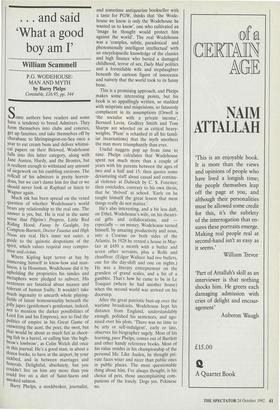. . . and said 'What a good boy am
I'
William Scammell
P.G. WODEHOUSE: MAN AND MYTH by Barry Plelps Constable, 116.95, pp. 344 Some authors have readers and some have a tendency to breed Admirers. They form themselves into clubs and coteries, get up fanzines, and take themselves off by charabanc to Shrimpington-on-Sea once a Year to eat cream buns and deliver whimsi- cal papers on their Beloved. Wodehouse falls into this latter category, along with Jane Austen, Hardy, and the Brontes, but is resilient enough to withstand any amount of siegework on his rambling environs. The rollcall of his admirers is pretty horren- dous, but we can't damn him for that or we Should never look at Raphael or listen to Wagner again.
Much ink has been spread on the vexed question of whether Wodehouse's world bears any relationship to the real one. The answer is yes, but. He is real in the same sense that Pilgrim's Progress, Little Red Riding Hood, Fanny by Gaslight, Ivy Compton-Burnett, Doctor Faustus and High Noon are real. He's inner not outer, a guide to the quixotic despotisms of the Spirit, which values requital over compro- mise and civitas.
. Where Kipling kept terror at bay by immersing himself in know-how and man- liness, a la Housman, Wodehouse did it by Upholding the proprieties his similes and metaphors were pledged to subvert. His sentences are fanatical about nuance and tolerant of human frailty. It wouldn't take Much ingenuity to unearth whole playing- fields of latent homosexuality beneath the Jolly japes (gentleman's gentleman, indeed, not to mention the darker possibilities of Lord Em and his Empress), nor to find the Politics of empire in his Great Game of outwitting the aunt, the poet, the swot, but that would be about as much fun as shoot- ing fish in a barrel, or calling him 'the high- brow's lowbrow', as Colin Welch did once in this journal. He's a good man, in about a dozen books, to have at the airport, by your sickbed, and in between marriages and funerals. Delightful, absolutely, but you couldn't live on him any more than you could live on a diet of Saint-Saens and smoked salmon.
Barry Phelps, a stockbroker, journalist,
and sometime antiquarian bookseller with a taste for PGW, thinks that 'the Wode- house we know is only the Wodehouse he wanted us to know', one who cultivated an 'image he thought would protect him against the world'. The real Wodehouse was a 'complex, subtle, paradoxical and phenomenally intelligent intellectual' with an encyclopaedic knowledge of the classics and high finance who buried a damaged childhood, terror of sex, Daily Mail politics and a formidable wife and stepdaughter beneath the cartoon figure of innocence and naivety that the world took to its funny bone.
This is a promising approach, and Phelps makes some interesting points, but his book is so appallingly written, so studded with misprints and misprisions, so fatuously complacent in its assumptions (Orwell is 'the socialist with a private income', Bernard Levin, Godfrey Smith and Tom Sharpe are wheeled on as critical heavy- weights, 'Plum' is rehashed in all his famil- iar incarnations) that the myth smothers the man more triumphantly than ever.
Useful nuggets pop up from time to time. Phelps calculates that Wodehouse spent not much more than a couple of years with his parents between the ages of two and a half and 15; then quotes some devastating stuff about casual and continu- al violence at Dulwich by C. S. Forester; then concludes, contrary to his own thesis, that he 'thrived' at school. 'Early on he taught himself the great lesson that most things really do not matter.'
He's also interesting, and a bit less daft, on Ethel, Wodehouse's wife, on his theatri- cal gifts and collaborations, and — especially — on money. Wodehouse turned himself, by amazing productivity and nous, into a Croesus on both sides of the Atlantic. In 1928 he rented a house in May- fair at £450 a month with a butler and seven other servants, plus a Rolls and chauffeur. (Edgar Wallace had two butlers, one for the day-shift and one on nights.) He was a literary entrepreneur on the grandest of grand scales, and a bit of a gambler. That's how he came to be in Le Touquet (where he had another house) when the second world war arrived on his doorstep.
After the great patriotic bust-up over the wartime broadcasts, Wodehouse kept his distance from England, understandably enough, polished his sentences, and ago- nised over his plots. 'There was no time to be arty or self-indulgent', early or late, observes his biographer sagely. Most of his learning, pace Phelps, comes out of Bartlett and other handy reference books. Most of his value resides in his championship of the personal life. Like Auden, he thought pri- vate faces wiser and nicer than public ones in public places. The most questionable thing about him, I've always thought, is his choice of pets, those uncomplaining com- panions of the lonely. Dogs yes. Pekinese no.


































































 Previous page
Previous page